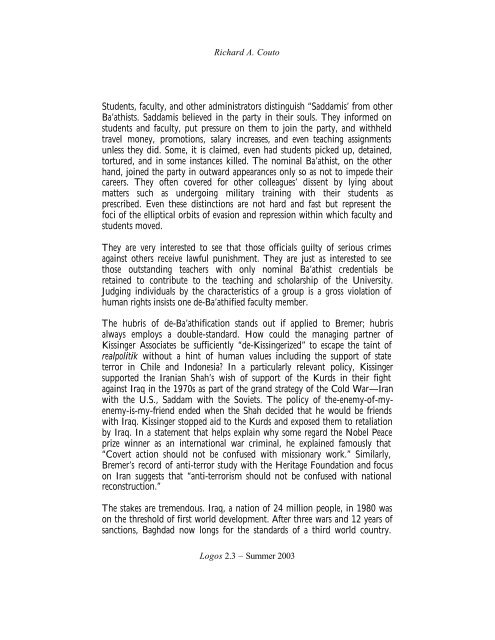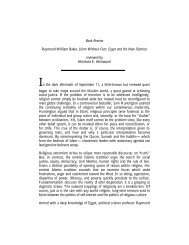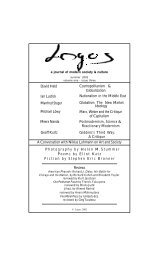Michael J. Thompson Stephen Eric Bronner Wadood Hamad - Logos
Michael J. Thompson Stephen Eric Bronner Wadood Hamad - Logos
Michael J. Thompson Stephen Eric Bronner Wadood Hamad - Logos
Create successful ePaper yourself
Turn your PDF publications into a flip-book with our unique Google optimized e-Paper software.
Richard A. Couto<br />
Students, faculty, and other administrators distinguish “Saddamis’ from other<br />
Ba’athists. Saddamis believed in the party in their souls. They informed on<br />
students and faculty, put pressure on them to join the party, and withheld<br />
travel money, promotions, salary increases, and even teaching assignments<br />
unless they did. Some, it is claimed, even had students picked up, detained,<br />
tortured, and in some instances killed. The nominal Ba’athist, on the other<br />
hand, joined the party in outward appearances only so as not to impede their<br />
careers. They often covered for other colleagues’ dissent by lying about<br />
matters such as undergoing military training with their students as<br />
prescribed. Even these distinctions are not hard and fast but represent the<br />
foci of the elliptical orbits of evasion and repression within which faculty and<br />
students moved.<br />
They are very interested to see that those officials guilty of serious crimes<br />
against others receive lawful punishment. They are just as interested to see<br />
those outstanding teachers with only nominal Ba’athist credentials be<br />
retained to contribute to the teaching and scholarship of the University.<br />
Judging individuals by the characteristics of a group is a gross violation of<br />
human rights insists one de-Ba’athified faculty member.<br />
The hubris of de-Ba’athification stands out if applied to Bremer; hubris<br />
always employs a double-standard. How could the managing partner of<br />
Kissinger Associates be sufficiently “de-Kissingerized” to escape the taint of<br />
realpolitik without a hint of human values including the support of state<br />
terror in Chile and Indonesia? In a particularly relevant policy, Kissinger<br />
supported the Iranian Shah’s wish of support of the Kurds in their fight<br />
against Iraq in the 1970s as part of the grand strategy of the Cold War—Iran<br />
with the U.S., Saddam with the Soviets. The policy of the-enemy-of-myenemy-is-my-friend<br />
ended when the Shah decided that he would be friends<br />
with Iraq. Kissinger stopped aid to the Kurds and exposed them to retaliation<br />
by Iraq. In a statement that helps explain why some regard the Nobel Peace<br />
prize winner as an international war criminal, he explained famously that<br />
“Covert action should not be confused with missionary work.” Similarly,<br />
Bremer’s record of anti-terror study with the Heritage Foundation and focus<br />
on Iran suggests that “anti-terrorism should not be confused with national<br />
reconstruction.”<br />
The stakes are tremendous. Iraq, a nation of 24 million people, in 1980 was<br />
on the threshold of first world development. After three wars and 12 years of<br />
sanctions, Baghdad now longs for the standards of a third world country.<br />
<strong>Logos</strong> 2.3 – Summer 2003




